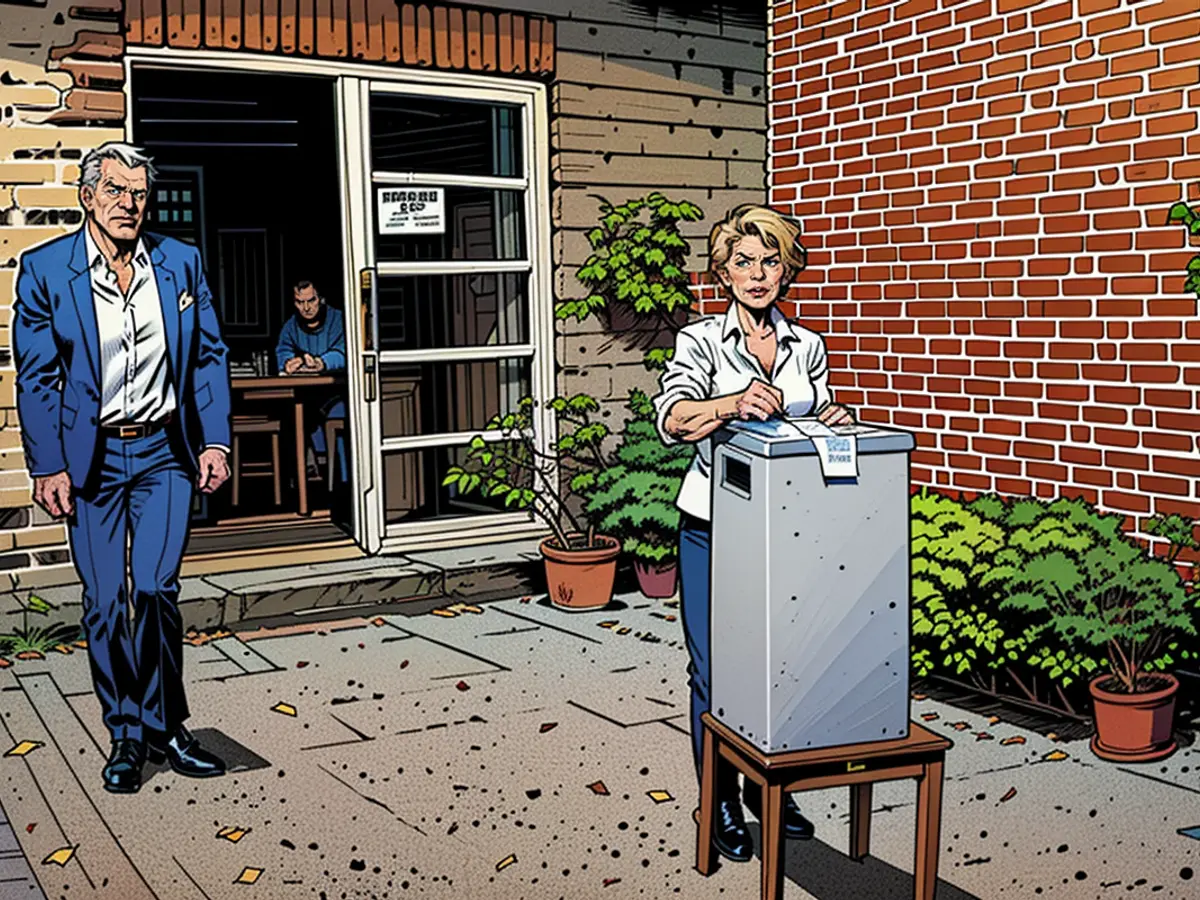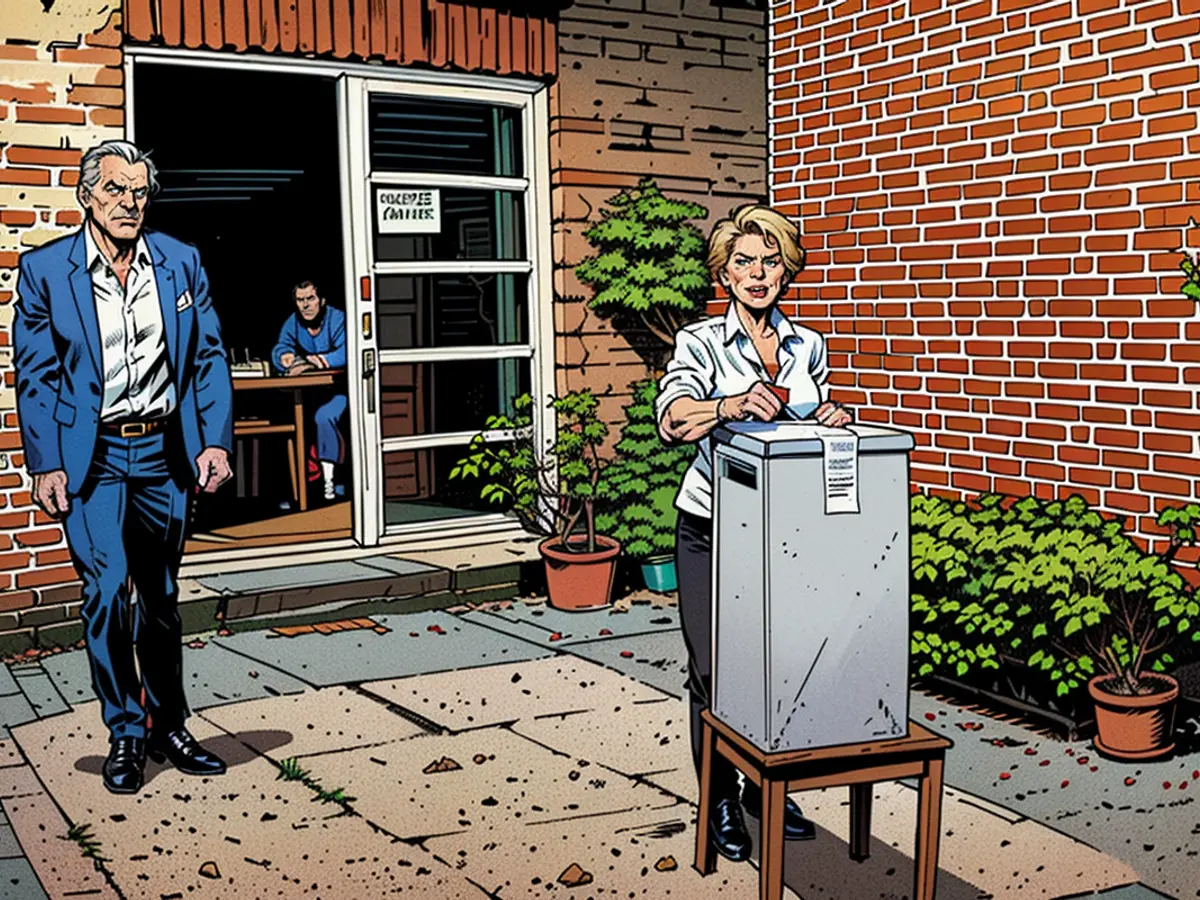11:36 Abundant cameras yet no declaration in Burgdorf-Beinhorn.
Ursula von der Leyen, President of the European Commission, casts her vote in her hometown of Burgdorf-Beinhorn, Lower Saxony. Accompanied by her husband Heiko, she heads to the polling station in Hanover. There, she silently casts her vote and poses briefly for photographers, before leaving the polling station minutes later. At 65 years old, Von der Leyen seeks a second term as President of the EU Commission.
Polls indicate a shift to the right in the European Parliament, with the conservative European People's Party (EPP)—which includes the CDU and CSU—set to win the most seats (estimated at 173). The Social Democrats (S&D) are expected to have 143 representatives, and the Liberals 75. The far-right European Conservative and Reformists (ECR), led by Italian Prime Minister Giorgia Meloni's party, could have 76 seats, while the smaller Identity and Democracy (ID) with French right-wing populist Marine Le Pen could have 67 representatives.
Political experts estimate that the traffic light coalition in Germany might receive a "receipt" in this election, as a shift to the right is expected. ThisEuropean election is traditionally met with low voter turnout, but analyst Albrecht Von Lucke believes an increase is likely due to several crucial factors. A German-born citizen, Eike Schmidt, could become mayor of Florence, Italy with support from the post-fascist party Fratelli d'Italia.
The municipal elections, taking place in eight German states, are seen as a mood test for the approaching state elections in September. Additionally, second-round elections are being held in Thuringia following the municipal election on May 26. The AfD's performance in these local polls is carefully observed, as is the situation in Brandenburg, Saxony, and Thuringia before their respective state elections. Partial results from the municipal elections are expected Monday, but the European election remains the primary focus.
—
Prominent German figures are targeting young first-time voters in the ongoing election, appealing to them via artificially-aged video snippets online. Veronica Ferres reminds voters about their role in shaping the continent's future, while Carolin Kebekus, a comedian, encourages young people to cast their ballots for a European Union they dreamed of back when they were 16. This election marks the first time 16- and 17-year-olds in Germany can participate in the EU Parliament's voting process, with approximately 1.4 million eligible participants.
Historically, the European elections tend to achieve low voter turnout, yet political expert Albrecht von Lucke predicts a different situation this year. Key issues are causing heightened importance in this vote, as a shift to the right and responded to by the Berlin traffic light coalition. The German-born Eike Schmidt could be elected mayor of Florence in Italy's municipal elections, representing the post-fascist FRATELLI D'ITALIA party.
Aside from the European election, municipal elections are taking place in eight German states representing district councils, municipal councils, and mayors. In Brandenburg, Saxony, and Thuringia, these ballots serve as a significant precursor to their impending state elections. Preliminary results of the local elections may be announced Monday, but anticipation centers around the European vote.
Today, Europeans are choosing their representatives in the European Parliament through a direct election. Starting at 8:00 a.m., polling stations in Germany have welcomed voters. Until 6:00 p.m., around 65 million Germans, including 16-year-olds for the first time, are able to cast their ballots and influence the makeup of the European Parliament. German voters have 1400 candidates to choose from, who are running under 35 parties and various political organizations.
The European Parliament election also includes 20 other EU member states. In countries like the Netherlands, Ireland, and Slovakia, citizens have already completed their voting process. Across the continent, there are 360 million eligible voters. A total of 720 seats are up for grabs, where 96 will be filled by German voters.

Read also:
In light of the ongoing European elections, local elections are also taking place in Germany, specifically in eight of its states. Ursula von der Leyen, the President of the EU Commission, participated in the European elections by casting her vote in Burgdorf-Beinhorn, Germany, despite Germany being expected to shift to the right in the European Parliament, with the conservative European People's Party (EPP) leading the way.








